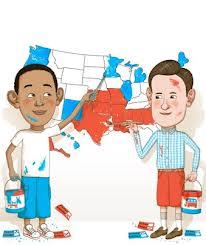
It's hard for the electoral college to lose when its defenders, like D J Tice of the Star Tribune, declare it a national treasure just because it did not this year result in a pyrotechnic debacle. By the same logic, he should recommend that we all take up Russian roulette. Six games would result in five Tice columns concerning the upside of this pastime.
It shouldn't require the brain spatterings of 2000 to persuade us to drop the electoral college and elect presidents the same way we elect every other office holder--most votes wins. This year's presidential election occurred in around eight states with less than a fifth of the country's population. For Republicans in California and Democrats in Texas, the only way to have an impact on the outcome was to give large sums of cash. The all-or-nothing allocation of electoral votes, which according to Tice brings "closure" to a tight election, does something tangible: it disenfranchises many millions of voters.
Tice nods in the direction of what ought to be deal-breaking flaws of the electoral college and then argues that they are trumped by airy nothing. Note that he does not give an example of a presidential election in which the national popular vote was so close that the winner was in doubt. That's because it's never happened, and there are mathematical reasons to suppose it never will. The electoral college is far more likely to trigger a crisis of legitimacy.
What about Tice's notion that the electoral college "forces candidates to seek broader national support"? Yes, that would explain why President Obama spent so much time stumping among rural whites in Kansas and Nebraska. The electoral college has the opposite effect of what Tice claims. It doesn't force candidates to broaden their appeal. It causes them to ignore wide swatches of the country.
The best way to force candidates to seek broad national support is to award the presidency to the one for whom the most Americans vote. When Hillary Clinton wanted to be a senator from New York state, she did not confine her effort to Manhattan. Actually, she pretty much ignored Manhattan. Instead, she barnstormed upstate, where her support was weakest. When a vote is a vote is a vote, it makes sense to try and win 47% instead of 42% of them in areas you know you will be outpolled.
Were the electoral college as splendid as Tice says, we would make little electoral colleges in all the states so that we could enjoy the undemocratic, distorting effects in our races for governor and US Senate as well. There's a reason no one is arguing for that kind of election "reform." We need the reform represented by the National Popular Vote movement.
